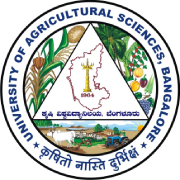
| AICRP Scheme/Unit : AICRP on Pigeonpea | |||||||||||||||||||||||||||||||||||||||||||||||||||||||||||
| Location : ZARS, GKVK, Bangalore | |||||||||||||||||||||||||||||||||||||||||||||||||||||||||||
| Year of Start:: 01-04-2001 | |||||||||||||||||||||||||||||||||||||||||||||||||||||||||||
| Mandates :
· Development of high yielding varieties resistant to diseases, pod borer and tolerant to terminal moisture and low temperature stresses. · Development of short duration genotypes, CMS based hybrids and effective seed production. · Integration of conventional breeding and molecular techniques to improve yield and disease resistance. · Development of improved production technology for bridging yield gaps. · Development of management technologies to minimize losses due to weeds. · Development and fine-tuning the Integrated Pest and Disease Management. · Identification of resistant sources for wilt, sterility mosaic disease and pod borers. · Testing of new bio-pesticides and fungicides to control insects and diseases · Testing of new molecules of insecticides, acaricides and fungicides to control insects and diseases. · Production and timely supply of nucleus, breeder and quality seeds and Popularization of newly released varieties and technology through Front Line Demonstrations. |
|||||||||||||||||||||||||||||||||||||||||||||||||||||||||||
| Research Programmes :
Crop improvement : 1.Development of high yielding,bold seeded short duration varieties with resistance to diseases 2. Development of high yielding,bold seeded mid early duration varieties with resistance to diseases 3. Development of high yielding,bold seed medium duration varieties with resistance to diseases 4. Nucleus seed production of released varieties at UASB (BRG1, 2, 3, 4, and 5). 5. Evaluation ICRISAT collaborative entries. 6. Integration of conventional breeding and molecular techniques to improve yield and disease resistance. Crop production : 1. Development of improved production technology for bridging yield gaps. 2. Design and development of suitable planting geometry for enhanced resource use efficiency. 3. Development of nutrient management techniques for higher productivity involving nano nutrients. 4. Development of management technologies to minimize losses due to weeds. 5. Development of suitable cropping system under changing climatic conditions. 6. Frontline demonstration of the new varieties (BRG5 and BRG3)
Crop protection : Entomology : 1. Preliminary Screening of medium maturity germplasm material (Local Stock) against major pod borers 2. Screening of advanced varieties (AVT1 +AVT2) against major insect pests (Early maturity -131-150 days 3. Screening of advanced varieties (AVT1 +AVT2) against major insect pests (Mid- Early maturity -151-165 days) 4. Screening of advanced varieties (AVT1 +AVT2) against major insect pests (Medium maturity -166-185 days) 5. Evaluation of different insecticidal schedules against major pod damaging insect pest of pigeonpea 6. Monitoring of Helicoverpaarmigera and Marucavitrata 7. Monitoring of other insects pests and natural enemies 8. Survey of farmers field regarding incidence of major insect pests and extent of damage 9. Frontline demonstration of the new varieties (BRG5 and BRG3) Plant Pathology : 1. Evaluation of new fungicides molecules for the management of soil borne diseases. 2. Production oriented survey for the diseases and pests in the pigeonpea growing areas. 3. Evaluation of insecticide molecules for the management of important pests. 4. Frontline demonstration of the new varieties (BRG5 and BRG3) |
|||||||||||||||||||||||||||||||||||||||||||||||||||||||||||
| Research Accomplishments :
I .Crop improvement :
Improved technologies released : Crop Production: Pigeonpea 1) Application of following secondary and micro nutrients has increased the grain yield of pigeonpea and hence recommended for farmers for application. a. Soil application of sulphur (20kg/ha) in the farm of Gypsum at 150 kg/ha. b. Soil application of Zinc sulphate (15 kg/ha) c. Seed treatment with sodium molybdate (4g/kg of seed) 2) Application of Rock phosphate (low cost P fertilizers) along with seed inoculation with phosphorous solubilising bacteria (PSB) is as effective as application of high cost DAP. 3) Yield of pigeonpea was more in pigeonpea + mungbean (1:1) additive intercropping wherein mungbean residue after pod picking was used as mulch compared to that in sole crop of pigeonpea. 4) Finger millet could be grown as an additive intercrop after every two rows of pigeonpea without reduction in the yield, so that small and marginal farmers could meet their domestic requirement of ragi grain and straw. 5) Pre-emergence application of herbicide Pendimethalene @ 0.75 kg a.i./ ha followed by one hand weeding at 50 days after sowing has been recommended for weed management. 6) Transplanting of 4-5 weeks old seedlings of Pigeonpea in Sole crop and finger millet + Pigeonpea intercropping (8:2 ratio) recorded significantly higher Pigeonpea grain equivalent yield, Net returns and B: C ratio compared to direct sowing of Pigeonpea. 7) Application of Pendemethalin @ 0.75 kg a.i/ha as pre-emergent herbicide + Imazathapyr @ 100 g a.i /ha at 20-25 days after sowing(2-3 leaf stage of the weed) as post emergent herbicide + one hand weeding at 50 days after sowing controlled weeds effectively. Crop Protection : A. Management of diseases of pigeonpea 1. Seed treatment with Carbendazim @2g/kg for the management of wilt 2. Seed treatment with 12 % Carbendazim +63 % mancozeb @ 3g/kg for the management wilt 3. Seed treatment with bio-agent Trichoderma Viride @5g/kg for the management of wilt 4. Two sprays of Propargite @ 1ml/l first spray at 25 DAS and second spray 10 days after first spray for the management of sterility mosaic disease 5.Two sprays of Fenazaquin@ 1ml/l first spray at 25 DAS and second spray 10 days after first spray for the management of sterility mosaic disease B. Management of insect pest of Pigeonpea Insecticides for the management of pests of pigeonpea
|
|||||||||||||||||||||||||||||||||||||||||||||||||||||||||||
| Awards / Recognitions :
Dr. H.C. Lohithaswa v UAS Best Teacher Award-2019 during Foundation Day of UAS, Bangalore on 5-10-2019 v NagammaDattatreyaRoa Desai Prize for best adaptive agriculture research in Karnataka during Foundation Day of UAS, Bangalore on 4-10-2017 v Elected Fellow of Indian Society of Genetics and Plant Breeding, New Delhi during 2013-14 v ICAR Best Teacher Award – 2013-14 during Foundation Day of UAS, Bangalore on 5-10-2013 v Natasarvabhouma Rajkumar SanmanaSamithi Award: 2011-12 for outstanding innovation and invention for enhanced food production by UAS, Bangalore during Foundation Day on 5-10-2012 |
|||||||||||||||||||||||||||||||||||||||||||||||||||||||||||
| Facilities Available :
v Sick plot for Fusarium wilt disease and hot spot for sterility mosaic virus v Basic facilities for fungal culture work. |
|||||||||||||||||||||||||||||||||||||||||||||||||||||||||||
| Other Activities :
v Conduct of frontline demonstrations for popularization of pigeonpea production and protection technologies v Conduct of training programmes for skill development among pigeonpea growers. |
|||||||||||||||||||||||||||||||||||||||||||||||||||||||||||
| Externally Funded Projects in Operation: | |||||||||||||||||||||||||||||||||||||||||||||||||||||||||||
| No. | Project Title | Principal Investigator | Funding agency | Year of Start | Year of Completion | Significant Outcome | |||||||||||||||||||||||||||||||||||||||||||||||||||||
| 1 | Development of MAGIC population and tagging of resistance to major diseases in maize (Zea mays L.) | Dr. H.C. Lohithaswa | DBT, GoI | 2023 | 2028 | ||||||||||||||||||||||||||||||||||||||||||||||||||||||
| 2 | Genetics and genomics of faster dry down in maize (Zea mays L.) | Dr. H.C. Lohithaswa | Bayer Cropscience Pvt. Ltd. | 2020 | 2024 | Inbreds with faster dry downhave been identified | |||||||||||||||||||||||||||||||||||||||||||||||||||||
| 3 | Sustainable practices of crops in relation to growth, anti-virus &anti-vector activities in response to seaweed extracts | Dr. A.S. Padmaja | M/s Sea6 Energy PVT. Ltd., Bengaluru | 2021 | 2022 | ||||||||||||||||||||||||||||||||||||||||||||||||||||||
| 4 | Improvement of Stress adaptive traits in crops using Endophytes under different Agro-ecology” | Dr. A.S. Padmaja | ICAR, New Delhi | 2022 | 2025 | ||||||||||||||||||||||||||||||||||||||||||||||||||||||
Staff Profile :
Scientific staff :

Academic Qualification : Ph.D
Area of Specialization : Genetics and Plant Breeding
Date of joining duty at UAS, Bangalore : 23-12-1997
Date of Joining Scheme /Unit : 07-09-2020
lohithc@rediffmail.com

Academic Qualification : Ph.D
Area of Specialization : Nutrient management, Resource recycling.
Date of joining duty at UAS, Bangalore : 17.07.2009
Date of Joining Scheme /Unit : 01.10.2019
arrehman@uasbangalore.edu.in
rehman.agron@gmail.com

Academic Qualification : Ph.D. (Agricultural Entomology)
Area of Specialization : Host plant resistance, Bt-Transgenics and IPM
Date of joining duty at UAS, Bangalore : 27.09.2013
Date of Joining Scheme /Unit : 16.02.2018
keshavaa_reddy@rediffmail.com

Academic Qualification : M.Sc.
Area of Specialization : Plant Pathology
Date of joining duty at UAS, Bangalore : 27-9-2013
Date of Joining Scheme /Unit : 09-07-2020
padmaja_as@yahoo.co.in
Technical staff

Academic Qualification : Diploma in Electronics
Date of joining duty at UAS, Bangalore : 05.07.2013
Date of Joining Scheme/Unit : 27.07.2021
-
- Page Visitors Count:
- Last Updated: March 19, 2025
- Site Statistics




